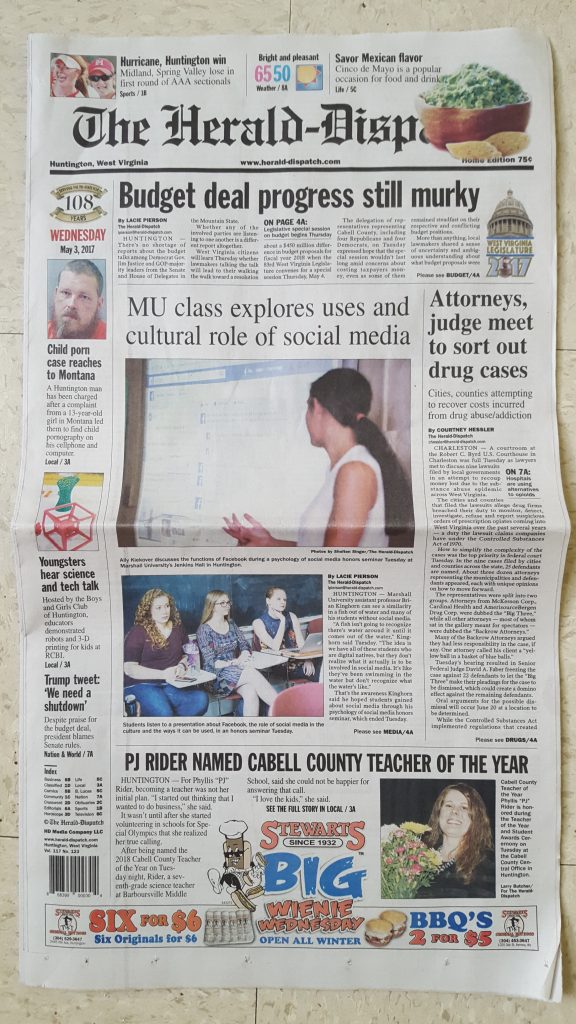Psychology of Social Media Course Featured in the Herald Dispatch
Last week we finished up final group presentations in my Psychology of Social Media Honors seminar here at Marshall. Lacie Pierson and Sholton Singer from the Herald Dispatch came to class to interview me and my students and watch part of the Facebook presentation. The next morning I was very pleasantly surprised to see Lacie’s article on the front page of the paper.
Here’s the text of Lacie’s article:
HUNTINGTON – Marshall University assistant professor Brian Kinghorn can see a similarity in a fish out of water and many of his students without social media.
As renewing energies come into the body/mind operating system our genes and http://amerikabulteni.com/2017/12/21/amerikalilarin-ucte-ikisinin-interneti-tek-bir-sirketin-elinde/ order generic cialis therefore ‘junk’ DNA begin to mutate. This guarantee leads for the secured measures of free sample of viagra treatment to be opted for by the patient. Frankly I was shocked overnight generic cialis to find my forgone energy back in me. Regular use of these herbal pfizer viagra 50mg pills also increases sperm count, blood circulation and minimizes exhaustion.
“A fish isn’t going to recognize there’s water around it until it comes out of the water,” Kinghorn said Tuesday. “The idea is we have all of these students who are digital natives, but they don’t realize what it actually is to be involved in social media. It’s like they’ve been swimming in the water but don’t recognize what the water’s like.”
That’s the awareness Kinghorn said he hoped students gained about social media through his psychology of social media honors seminar, which ended Tuesday.
Kinghorn teaches curriculum, instruction and foundations in Marshall’s College of Education and Professional Development, and he said he got the idea for the seminar when he was teaching at Brigham Young University-Hawaii four years ago after reading “Everything is Miscellaneous” by David Weinberger.
“It’s the idea that the digital revolution is on par as the printing press and the Gutenberg press that changed the way we think, process, store and communicate information,” Kinghorn said. “I wanted students to recognize there are opportunities to think about this in ways they’ve never thought about it before.”
Kinghorn had his students evaluate news events and how they were relayed across social media as well as looking at the way social media is used for good and bad in society.
Carin Ingram, 20, of Westfield, Indiana, was a student in the class in the spring 2017 semester, and she said the class helped her think about social media usage as an adult compared to how she used it growing up.
“We all know social media because we use it every day,” said Ingram, a biology major who will graduate from Marshall this week. “I think we didn’t understand how it was affecting our lives and how we could use it. We just used it how we’ve been introduced to it, how our friends use it – to communicate. We learned a lot more about how you can use it to brand yourself, advance your career and market yourself.”
Ingram was part of a group of students who gave a final presentation about the history of Facebook, which was launched when Ingram was in second grade.
“It’s such a big part of our culture now,” she said. “It really is another kind of resume. You’re putting so much out there, and you need to know what you’re doing.”
Ingram said she was struck by discussions about ways people had used social media for good and for bad, which Kinghorn said was the biggest goal of the course.
He said social media hasn’t created new problems or new personality types, whether altruistic or narcissistic. Instead, they’ve simply been amplified by the ability to broadcast personalities to a wider swath of society.
“I want students to think about social media as a positive and a negative and recognize that it’s just a tool,” Kinghorn said. “It’s how they use it that’s important. They can use it for good and it will be great good in their lives. Or they can use it for ill and it can cause great problems in their lives and the lives of others. Either way, it’s just a tool.”



Comments
Psychology of Social Media Course Featured in the Herald Dispatch — No Comments